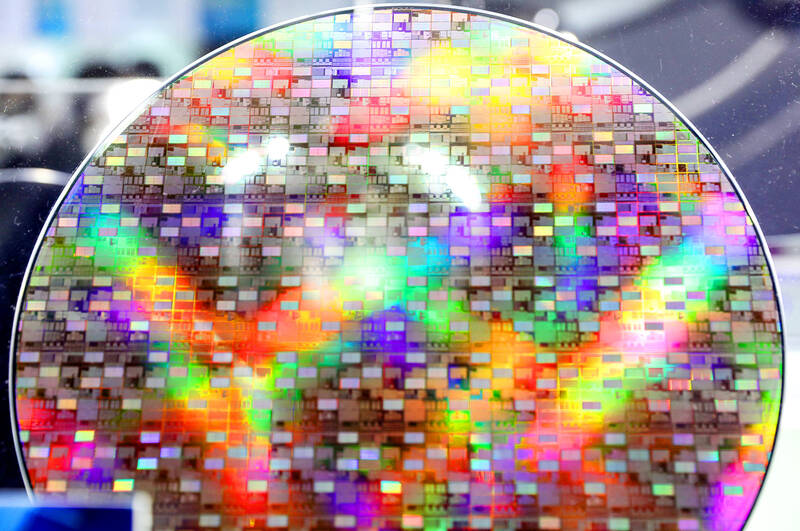Taiwan Semiconductor Manufacturing Co’s (TSMC, 台積電) new US investment plan would be positive for domestic equipment vendors, Yuanta Securities Investment Consulting Co (元大投顧) said yesterday.
The chipmaker’s expanded investment in Arizona is expected to benefit Taiwanese turnkey engineering companies in the initial stage of fab construction, Yuanta said in a report.
TSMC’s plan to build three more chip fabs, two advanced packaging plants, and one research and development center over the next four years will also have a constructive effect on Taiwanese original equipment manufacturing (OEM) firms and consumable vendors over the medium and long term, it said.

Photo: AFP
“TSMC’s additional US$100 billion investment in Arizona highlights the company’s key role in the US semiconductor manufacturing ecosystem. This continues the trend in recent years in which advanced node technologies and supply chain localization will continue to drive the medium to long-term growth of the semiconductor equipment sector,” Yuanta said.
Front-end equipment for advanced semiconductor processes accounts for 70 to 80 percent of global semiconductor equipment spending, the report said.
However, the semiconductor equipment market is highly concentrated, with the top five global suppliers — ASML Holding NV, Applied Materials Inc, Lam Research Corp, Tokyo Electron Ltd and KLA Corp — capturing about 80 percent of the market, it said.
Taiwan’s forte is in front-end equipment OEM, turnkey automation service, back-end process equipment supply, component maintenance and repair service, and channel business, it said.
“With the experience of the first fab in Arizona, TSMC suppliers should see improved turnkey operations in the second fab in terms of contract allocation, project content and cost structure,” Yuanta said.
TSMC’s continued expansion of its US operations would benefit its major clean room — automated supply system and turnkey engineering vendors United Integrated Services Co (漢唐) and Marketech International Corp (帆宣), which derived 50 to 60 percent and 20 to 30 percent respectively of their revenue from TSMC’s US fabs in the past two to three years, the report said.
Other potential beneficiaries are OEM firms Foxsemicon Integrated Technology Inc (京鼎) and Feedback Technology Corp (翔名), as well as advanced packaging-related companies Grand Process Technology Corp (弘塑), Scientech Corp (辛耘) and All Ring Tech Co (萬潤), it said.
Suppliers of semiconductor consumables used in the manufacturing process, such as Topco Technologies Corp (崇越), Gudeng Precision Industrial Co (家登), Kinik Co (中砂) and Allied Supreme Corp (上品), were also named in the report.
Moore Securities Investment Consulting Co (摩爾證券投顧) analyst Hsieh Ming-che (謝明哲) yesterday said that TSMC’s new US investments could help Taiwanese equipment vendors attract new orders and boost their earnings.
“While the costs of shipping the equipment to the US and increased installation costs must be factored in, equipment vendors like Marketech and Allied Supreme would be among the major beneficiaries from demand growth for advanced node equipment and materials in the medium to long term,” Unique Satellite TV quoted Hsieh as saying.

Jensen Huang (黃仁勳), founder and CEO of US-based artificial intelligence chip designer Nvidia Corp and Taiwan Semiconductor Manufacturing Co (TSMC, 台積電) on Friday celebrated the first Nvidia Blackwell wafer produced on US soil. Huang visited TSMC’s advanced wafer fab in the US state of Arizona and joined the Taiwanese chipmaker’s executives to witness the efforts to “build the infrastructure that powers the world’s AI factories, right here in America,” Nvidia said in a statement. At the event, Huang joined Y.L. Wang (王英郎), vice president of operations at TSMC, in signing their names on the Blackwell wafer to

France cannot afford to ignore the third credit-rating reduction in less than a year, French Minister of Finance Roland Lescure said. “Three agencies have downgraded us and we can’t ignore this cloud,” he told Franceinfo on Saturday, speaking just hours after S&P lowered his country’s credit rating to “A+” from “AA-” in an unscheduled move. “Fundamentally, it’s an additional cloud to a weather forecast that was already pretty gray. It’s a call for lucidity and responsibility,” he said, adding that this is “a call to be serious.” The credit assessor’s move means France has lost its double-A rating at two of the

AI BOOST: Although Taiwan’s reliance on Chinese rare earth elements is limited, it could face indirect impacts from supply issues and price volatility, an economist said DBS Bank Ltd (星展銀行) has sharply raised its forecast for Taiwan’s economic growth this year to 5.6 percent, citing stronger-than-expected exports and investment linked to artificial intelligence (AI), as it said that the current momentum could peak soon. The acceleration of the global AI race has fueled a surge in Taiwan’s AI-related capital spending and exports of information and communications technology (ICT) products, which have been key drivers of growth this year. “We have revised our GDP forecast for Taiwan upward to 5.6 percent from 4 percent, an upgrade that mainly reflects stronger-than-expected AI-related exports and investment in the third

RARE EARTHS: The call between the US Treasury Secretary and his Chinese counterpart came as Washington sought to rally G7 partners in response to China’s export controls China and the US on Saturday agreed to conduct another round of trade negotiations in the coming week, as the world’s two biggest economies seek to avoid another damaging tit-for-tat tariff battle. Beijing last week announced sweeping controls on the critical rare earths industry, prompting US President Donald Trump to threaten 100 percent tariffs on imports from China in retaliation. Trump had also threatened to cancel his expected meeting with Chinese President Xi Jinping (習近平) in South Korea later this month on the sidelines of the APEC summit. In the latest indication of efforts to resolve their dispute, Chinese state media reported that